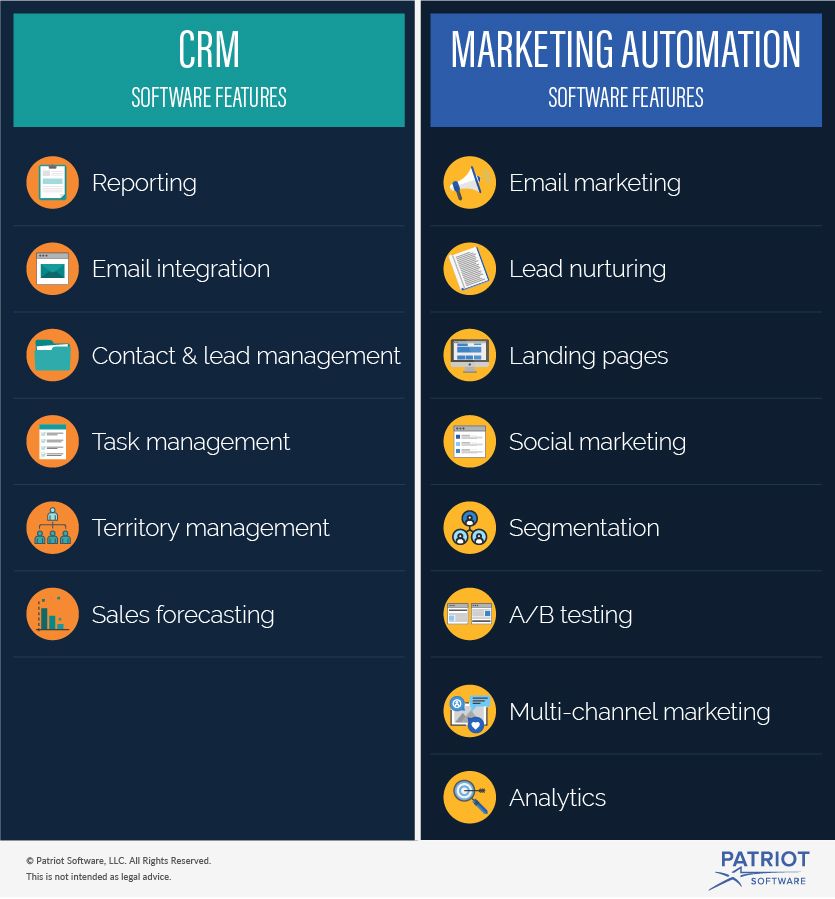Sales and marketing are undeniably intertwined. To successfully find, nurture, close, and retain leads the two departments have to work together. And to that end, it’s often assumed that the two departments can use the same software solutions to do their work. After all, the same audience members touched by marketing automation software will also be touched by customer relationship management software (CRM)—sometimes even simultaneously.
However, the two software solutions perform different functions, and depending on the size and strategies of an organization, each could be essential to growing a customer base. While both streamline, automate, and advance the efforts of their users, the main challenge they exist to solve differs.
Marketing is all about attracting leads to bring them into the funnel. It’s casting a wide net and reeling in the people who most need your product or service.
Customer relationship management is about the development of those leads once they’re in the funnel. It’s a deep dive into a leads’ goals and challenges so that a sales rep can use that information to move leads towards the close.
Let’s keep these key differences in mind as we examine the features of both CRM and marketing automation.
Marketing Automation Software Features
Marketing technology spend today has now surpassed advertising spend, which used to be the center of most marketing strategies. Marketers are making the switch to automation and other marketing software tools because while advertising was once like throwing spaghetti against a wall to see what would stick, software is data-driven for results. Here are some of the features you can expect to see in marketing automation software:
Email Marketing: The ability to automate email campaigns such as newsletters, promotions, and drip campaigns comes with many marketing automation tools.
Lead Nurturing: Marketing automation spans channels to reach and nurture prospects based on customer behavior data, demographics, and more.
Landing Pages: Some marketing automation products include tools that make it easy for people without developer or design skills to build landing pages.
Social Marketing: There is no denying the immense role social media plays in consumers’ lives. Thus, many marketing automation platforms include a built-in social media option, or one that easily integrates with an outside social media marketing tool.
Segmentation: Segmentation tools place customers in groups based upon their activity in the past in order to target them with campaigns that should more specifically appeal to them.
A/B Testing: Marketing automation allows you to test variations of campaigns to see which ones are most effective and plan going forward.
Multi-channel Marketing: Customers aren’t just online in one place, they’re online everywhere. Marketing automation makes it easy to create cohesive campaigns that span channels like video, social, and email.
Analytics: Reporting tools help you understand how customers are interacting with campaigns and analyze how effective they’ve been.

CRM Software Features
Before software solutions existed, sales teams relied on a Rolodex with little more than contact information and a few notes to keep track of their leads. Today, CRM software provides sales teams with the capability to store detailed information about where each customer is within the sales process, report and forecast, and automate processes and reminders. Most CRMs include the following features.
Reporting: Strategies can’t be properly created without the facts to support one direction over the other. Reporting provides you with the data you need to understand your sales cycle and make sales forecasts.
Email Integration: Email is a powerful way to communicate with your customers. CRMs allow you to send email directly from the tool so you can track open rates, click rates, frequency, responses, and so on.
Contact and Lead Management: Being able to track and manage your sales process is more direct and personalized when you can do it on a per customer basis, rather than taking a more blanketed approach. CRMs narrow your contact and lead management for you.
Task Management: CRMs with a task management tool allow reps to assign, schedule, and complete tasks related to the sales process all in one place. They also provide visibility to team members as to what stage a client is in, or what tasks are still needing attention.
Territory Management: Organize leads lists by geographic location and assign to the representative accountable for that area.
Sales Forecasting: Forecasting helps give you a benchmark to determine whether or not your efforts are driving results.
One thing to note about marketing automation and CRM is that the two software tools can often be integrated. Business leaders who decide that both tools could be beneficial in helping their teams meet their goals can look for solutions that work together. That way, just as a lead passes from marketing to sales, so too can it pass from an automation tool to a CRM.
These views are made solely by the author.
